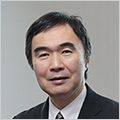トップページ
 イベント・広報
イベント・広報
 R-CCS Cafe
R-CCS Cafe
 第158回 第1部
第158回 第1部
第158回 第1部
講演題目
Beyond Post-K and Moore’s Law --- Imminent Failure of FLOPS-centric HPC leading to a Bright Future towards Post-Moore
| 開催日 | 2019年1月11日(金) |
|---|---|
| 開催時間 | 13:00 - 14:00 |
| 開催都市 | 兵庫県神戸市 |
| 場所 | R-CCS 6階講堂 |
| 使用言語 | 発表・スライド共に英語 |
| 登壇者 |
松岡 聡 R-CCS センター長  |
講演要旨
No one can now deny the inevitability that Moore’s Law, which has sustained performance growth in computing terms of FLOPS, is approaching its end; already the number of fabs that sustain continued shrinkage of lithography is less than a handful, as technical difficulties result in soaring costs, with little hope for economic gains. Architectural one-time techniques to circumvent the limitations, such as many-core architectures as well as reduced precision computing, have already been applied as today’s techniques, and thus cannot be “used again” to attain speedups. As such we might consider ourselves to be in crisis --- as transistor power improvement saturate over time, our next machines will no longer be significantly faster in terms of “catalog FLOPS” compared to the machines in the early 2020s as all the techniques to improve FLOPS in a straightforward way will be used up, be it for HPC or for other apps such as AI. However, the situation in reality is welcome, as we can finally break away from the classical, FLOPS-centric thinking (as per represented by outdated metrics such as Linpack/Top500), and move onto the real of new computing paradigms to improve the time-to-solutions of real applications. Already such “Post-Moore” research has arisen recently in a global fashion, and it is essential that, Riken R-CCS as the leadership center in High Performance Computing in Japan, to break away from FLOPS mindset and assume leadership in alternative devices and architectural parameters leading to new programing, new algorithms and new applications, Already some of us are at the task with new research agenda, from Data or BYTES-centric computing, use of ML to augment/replace first-principle simulations, as well as new computing models such as neuromorphic as well as quantum computing. We will discuss our future research roadmaps and activities for research on machines beyond Post-K in the late 2020s, as well as into the 2030s.
(2018年12月26日)
